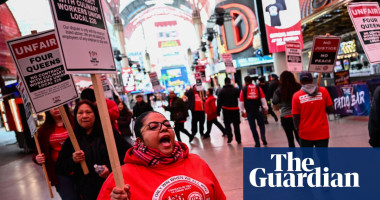US unions target the housing affordability crisis as their ‘biggest issue’
Organized labor across the country is now setting its sights on housing costs as rents and mortgages continue to soar
As housing has become a top issue in strikes and protests in recent months, US unions are pushing for change and backing innovative solutions for the housing affordability crisis.
With US house prices and rents rising in recent years, and high interest rates and inflation taking their toll, housing affordability has become a major issue at the bargaining table for US labor unions. Many workers are facing 60-, 90-, even 120-minute commutes to work because they cannott afford to live near their jobs.
Housing has been a big issue in the recent rolling strikes by thousands of Los Angeles hotel workers. In Oregon, 400 Yamhill county government employees went on strike in November because, the union said, “many workers are not able to afford housing”. In the Twin Cities, worker dismay about large rent hikes is fueling plans for a multi-union strike by up to 30,000 workers in March. When San Francisco hotel workers hold contract talks later this year, housing affordability will be a top issue.
